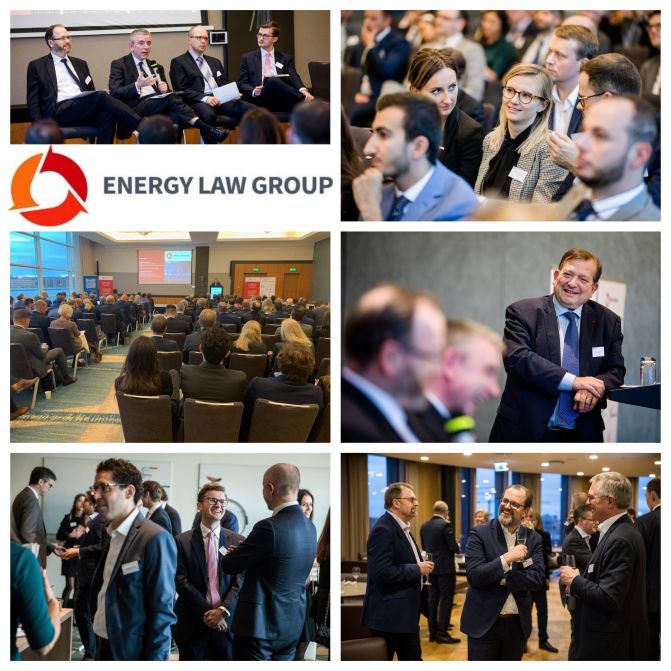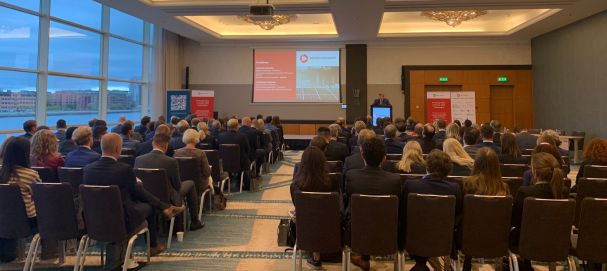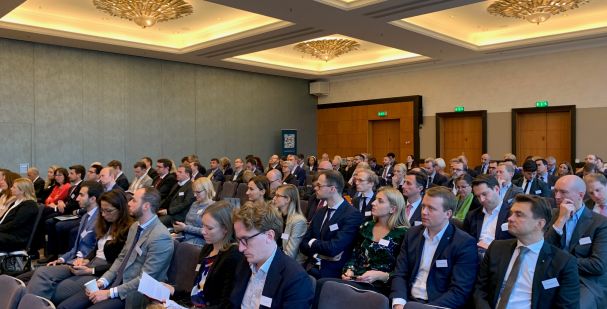October, 2019
On 4 October 2019, the ELG together with Danish member firm Gorrissen Federspiel held its 6th Energy Law Group Event at the Marriott Hotel in Copenhagen (Denmark).
The Energy Law Group Event brought together leading energy industry practitioners, regulators, bankers and lawyers from around 40 jurisdictions who shared their experience on the industry’s most compelling issues.
- Workshop 1: Offshore wind energy
- Workshop 2: Investments in cross border transmission connections
- Workshop 3: Protection of energy investments
- Workshop 4: Energy transition
- Workshop 5: Power Purchase Agreements
- Workshop 6: Energy and mining in Africa
WORKSHOP 1: OFFSHORE WIND ENERGY
A workshop to explore how technological, legal, financing and regulatory innovation is driving the development of the global offshore wind sector, the roles played by key industry participants (including regulators, TSOs, developers and investors) and the future challenges facing the sector. Topics are expected to include the key technological developments (e.g., the increasing size of turbines, floating turbines); recent developments in project financing structures; the changing perception of construction risk; cross-jurisdictional projects (e.g., the North Sea Wind Power Hub); how differences in regulatory frameworks impact upon returns; grid connection challenges; the move towards subsidy-free offshore wind; and developers looking to new frontiers (e.g., the U.S., Taiwan, India etc).
- Developments in German regulation of offshore wind: Frank-Peter Hansen, TenneT, senior manager regulation
- Offshore Floating Wind | Windfloat Atlantic: José Pinheiro, Project Windfloat Atlantic, project manager
- The perspective of the (financial) investors and developments in the US off-shore wind market: Christian Skakkebæk, CIP, senior partner
WORKSHOP 2: INVESTMENTS IN CROSS BORDER TRANSMISSION CONNECTIONS
A workshop that will explore international issues in cross-border energy transit.
Latest Status of the BeDeLux Interconnector | Turkey’s Increasing Role as the Energy Hub Between the East and West | Will Cyprus Become a Key Player in the Region? | Will the EU – Ukraine Energy Bridge Project Happen?
Opening: Investments In Cross-Border Transmission Connections
- Moderator BeDeLux Interconnector (Cross Border Transmission Connection) and the Harmonized Allocation Rules For Long-Term Transmission Rights: Delia Nitescu, Director (Wildgen, Luxembourg)
- Updates on the Gazprom–Naftogaz Dispute / Details of EU – Ukraine Energy Bridge PPP: Yaroslav Petrov, Partner (Asters, Ukraine)
- Latest News on the EuroAsia Interconnector Project | Will Cyprus Become a Key Player in the Region?: Andrew Demetriou, Partner (Ioannides Demetriou (ID), Cyprus)
- External Speaker: Mr Patrick Hébréard (Managing Director/FTI Consulting)
- Current and Ongoing Transit Pipelines Going Through Turkey / Relevant Potential Challenges and Opportunities for Turkey and the Region: Umut Kolcuoğlu (Kolcuoğlu Demirkan Koçaklı, Turkey)
- Q&A and Panel Discussions, Concluding Statements: All Speakers
WORKSHOP 3: PROTECTION OF ENERGY INVESTMENTS
The stronger the protections provided to an investor, the higher the investment flows and the lower the risks in host states. Generally, investment protection instruments include several options among which are BITs and multilateral treaties which are the primary safeguards for investor protection. These may well be supplemented by contractual provisions on investor protection agreed with a host government or state-owned subsidiaries.
When investor protections are breached by a host state, an investor may initiate arbitration and seek compensation. In this context, however, the future of Intra-EU BITs has become rather uncertain post Achmea case ruled by CJEU on March 6, 2018. Depriving investors of the benefits of the ISDS mechanism may affect investment/ capital flows in the EU.
While in the Achmea decision the CJEU focused on incompatibility of intra-EU BITs with EU law, a similar approach may be expected in relation to clauses in BITs concluded by EU Member States with non-EU States.
It is possible that the reasoning provided by CJEU in the Achmea decision shall have far reaching consequences and affect arbitration proceedings initiated under the Energy Charter Treaty (ECT).
Opening: Energy Disputes and Investment Protection: Milan Pandev, Partner, Yassen Spassov, Senior Associate (DGKV Bulgaria)
- Bilateral Investment Treaties: Micula vs. Romania (Enforcement of Awards and State Aid): Arnoldas Puodžius, Senior Associate (Ellex Lithuania)
- The Preliminary Ruling in the Achmea (formerly Eureko) vs. Slovakia (Impact on Intra-EU and Other Arbitratration Awards): Nikola Minchev, Senior Associate (DGKV Bulgaria)
- Key note speech | Experience of RES Investors in Ukraine: Fredrik Svinhufvud, Co-Founder and Partner (Vindkraft Ukraina), General Director and Owner (Vattenkraft Ukraina)
- EU Proposal to UNCITRAL Working Group (the Future of Investment Arbitration): Yaroslav Petrov, Partner (Asters Ukraine)
- Energy Community Secretariat’s Dispute Resolution and Negotiation Centre: Smaranda Miron, Energy Lawyer (Energy Community Secretariat)
- Q&A and Panel Discussions, Concluding Statements: All Speakers
WORKSHOP 4: ENERGY TRANSITION
The energy system is undergoing some of the fastest and most dramatic changes in history. The emergence of disruptive technologies coupled with EU policy drivers means that the pace and scale of change is likely to increase over the coming years. The purpose of this workshop is to explore issues, challenges and opportunities associated with structural transformation of the energy system from what we have today to a zero-carbon future. Key themes will include an examination of future energy scenarios, regulatory and policy drivers, investment opportunities and financing considerations.
Introduction: Rabbe Sittnikow/Kati Punakallio, Hannes Snellman, Finland
Opening Address | Energy Transition Issues: Matt Brown, Vice President Energy Management Consulting, Pöyry
- Roundtable Discussion | Perspectives on the Energy Transition: Opportunities and Challenges:
Moderator
- Alex McLean, Arthur Cox, Ireland
- Sonya Twohig, Director of Operations, ENSTO-E
- Professor Michael Bradshaw, Professor of Global Energy, Warwick Business School
- Jim Gannon, Chief Executive, Sustainable Energy Authority of Ireland (Recently announced as the new Member of the Commission for Regulation of Utilities in Ireland)
- Thomas Thygesen, Head of Strategy, SEB Merchant Banking
- Matt Brown, Vice President Energy Management Consulting, Pöyry
WORKSHOP 5: POWER PURCHASE AGREEMENTS
An exploration of the topic of corporate power purchase agreements from the perspective of practical legal experience, corporate customers, financiers and the electricity industry. Aims are: (i) to introduce the legal and commercial aspects of how to successfully complete a corporate PPA; (ii) to get a corporate’s perspective on what attracts them to enter into a corporate PPA; (iii) to get a financier’s perspective on what is fundable and bankable in this space; and (iv) to get an industry view on the progress and viability of corporate PPAs in the long term.
Opening – Sleeved or Synthetic: Are Corporate PPAs the new Baselayer for the Electricity Industry: John Grady, Partner (Shepherd and Wedderburn LLP, Scotland)
- Legal perspective: Some examples of successfully completed corporate PPA’s, Lessons Learned: Inge Ekker Bartnes, Partner and Svanhild Vesterheim, Senior Associate (Wiersholm, Norway)
- Financier’s perspective: What is required to be able to finance a corporate PPA?: Mortimer Menzel, Partner (Augusta)
- Industry perspective: What does a generator require to be able to offer a corporate PPA in the current market?
- Panel Discussion: Questions and answers from the room:
Panel Participants
- John Grady, Shepherd and Wedderburn LLP, Scotland
- Inge Ekker Bartnes, Wiersholm, Norway
- Colin Spain, Facebook
- Mortimer Menzel, Augusta
- Industry participant, TBC
- Stefanía G. Halldórsdóttir, Landsvirkjun, Iceland
WORKSHOP 6: ENERGY AND MINING IN AFRICA
Moderator: Thierry Lauriol
- Trends and projects in the Angolan energy sector : Irina Ferreira, ALC Advogados, Angola (Morais Leitão, Galvão Teles, Soares da Silva & Associados)
- The Sahara Wind Project – Atlantic trade winds powering Africa’s 1st Multi-Gigawatt regional transmission infrastructure: Khalid Benhamou, Managing Director, Sahara Wind
How wind-desalinated agriculture, carbon-free iron-ore and phosphate processing are likely to provide a scaled, operational balancing to Africa’s first Multi-Gigawatt HVDC transmission infrastructure.
- The challenges of economic regulation for electricity and gas investments: Emmanuel Grand, Managing Director, FTI
- Mozambique Rising: The devil is in the details: Claudia Santos Cruz, Partner (MLGTS, Mozambique)
It could become one of the world’s largest LNG exporters and also has other extractive and renewable energy potential. Much depends upon successfully implementing its ambitious energy and PPP sector reform, in respect of which some aspects are still ambiguous and enforcement by regulatory authorities is slow. Unlocking this potential depends on attracting long-term investments; guaranteeing legal certainty and reducing external debt.
- They say the road to hell is paved with good intentions: Changing legal frameworks in DRC: Hollanders Thibaut, Partner, Liedekerke RDC
African governments have recently engaged in legal reforms in virtually every energy sector in an attempt to accelerate development. Particularly in the Democratic Republic of Congo, major reforms have been implemented in both the electrical and mining sectors, with the declared intention to promote development by opening the energy market, promoting PPPs while trying the improve the position of state owned public companies in existing PPPs. Thoughts on the first few years of the reform – identification of the main bottlenecks and attractive features of the energy sector, consequences of the unilateral renegotiations of the DRC Mining Code and the fate of existing contracts/situation and the attractiveness of major players.
- Egypt: The Energy Hub: Yasser Hashem, Partner (Zaki Hashem & Partners, Egypt) – Egypt: The Energy Hub
- Dispute settlement (arbitration and mediation) in the energy and mining sectors in Africa: Martin Tavaut, Counsel, Jeantet
There has been a surge in disputes in the mining and energy sector in Africa in the latest years.



